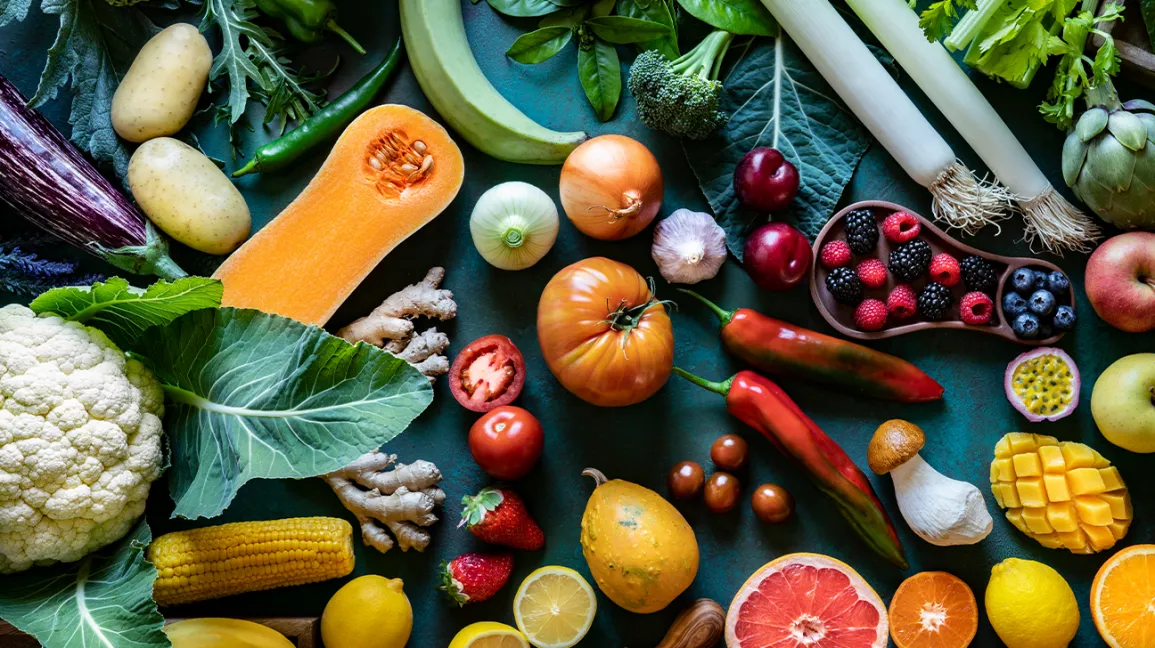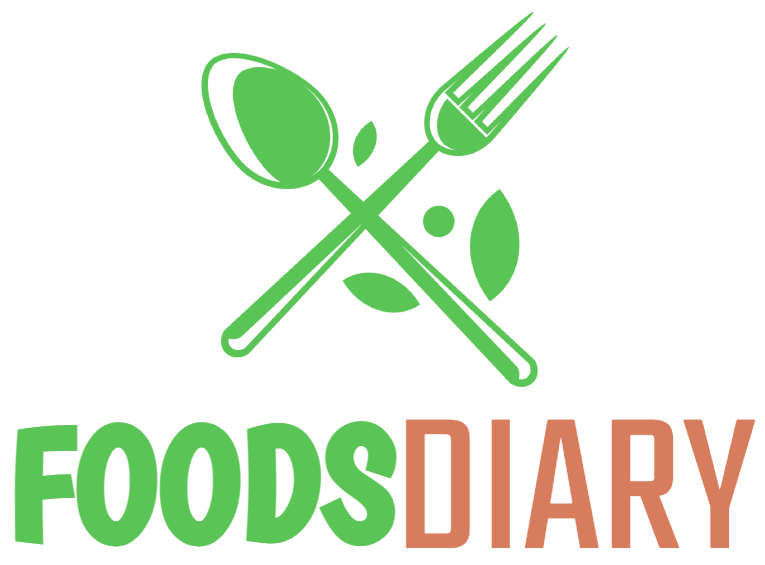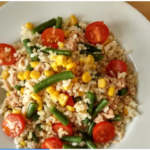In these times, there is no one who has not heard of the vegetarian diet and its myths or truths. It is increasingly common to meet people who, for very different reasons, whether nutritional, ethical, religious or health, have asked themselves: “how do I start being a vegetarian?”
In this article we will discover what vegetarianism is, the different types that exist, how to start being vegetarian, what foods can or cannot be eaten, the benefits that this way of eating brings to health and some recipes to follow a vegetarian diet of the most original. If you want to learn some tips to start being a vegetarian, keep reading!
What is vegetarianism? – Find out first
Whatever the reason for which you have decided to know how to be a vegetarian and not die trying, the first thing you should do before anything else is to inform yourself well about this type of nutritional diet to know what it is based on, what it implies, what benefits contributes to our body and what foods you can or cannot eat from now on if you do it consciously.
Vegetarianism is a dietary practice that is based on avoiding eating any type of animal meat (including fish and poultry). While it is true that most people who decide to follow this diet do so to improve their health, there is also a moral and philosophical component of not exploiting animals and helping the environment that makes starting vegetarianism easier, more productive and, above all, sustainable for planet Earth.
The word “vegetarianism” comes from 1842, the year in which the British Vegetarian Society was founded in England, which was the first association of vegetarians in the world to coin this term when it found inadequate references to “vegetable diet” or “meatless diet” that were used up to that time. This word derives from the Latin vegetal and, contrary to what one might think logically, it means “complete, healthy, fresh or lively”, and not “the one who eats vegetables” as many believe. With this, English vegetarians wanted to refer not only to the use of vegetables in the diet but also to the moral and ethical component of this lifestyle.
Types of vegetarianism – Decide yours
There are several types of profiles depending on the foods that are included in the vegetarian diet, but the common denominator remains the same: the non-intake of any type of animal meat. This classification is based on the degree of rigor with which vegetarians decide to eat more or less products with ingredients of animal origin in their composition:
- Ova-vegetarianism: is a type of vegetarian diet in which eggs (from any bird) are consumed, but no dairy or honey.
- Lacteovegetarianismo: instead, in this type, dairy products such as milk, yogurt or cheese are consumed, but not eggs or honey.
- Ovolacteovegetarianismo: groups the previous 2, being able to eat both eggs and dairy but not honey.
- Apivegetarianism: yes, honey is consumed but not dairy or eggs.
- Apiovolacteovegetarismo: if the 3 foods are consumed at the same time (honey, eggs and dairy products) the vegetarian diet will be of this type.
- Veganism: is a type of food practice in which no food containing ingredients of animal origin is consumed, without exception. But more than a type of diet, it is a lifestyle that is committed, for ethical and moral reasons, not to use animals for our own purposes in any way, which also applies to other aspects everyday items such as clothing, footwear or furniture and household items.
- Raw food: here only uncooked food is consumed, that is, raw, whether vegetables, fruits, seeds, nuts or cereals. At most, food can be cooked up to 40 °C so that it does not lose its natural properties. All the modalities mentioned above can be raw food.
- Frugivory: only fruit of all its varieties is consumed, especially in season.
- Flexitarianism or flex vegetarianism: refers to a recent trend that emerged a few years ago based on a vegetarian diet combined occasionally and/or opportunistically with the intake of some animal product, but always maintaining a much higher percentage of vegetarian foods.
Thus, there are many profiles and labels to classify you if you really want to be a vegetarian, but it is important that you know that all extremes are bad and unnecessary, so being aware of what the human body needs to be well nourished and being clear about the reasons why which you eat what you eat is always paramount. For now, to maintain a healthy diet, we recommend the recipes from El Garner Integral with which you will always eat healthy and ecologically.
How to start being a vegetarian? – What can you eat?
There is no single way to start a vegetarian diet because everyone is different and there is no standard formula for making the switch. So the way to start being a vegetarian will depend on each individual and the pace at which he wants to do it. The transition can be made quickly, that is, stopping eating meat and fish radically and suddenly, or gradually, eating these foods less and less frequently and gradually eliminating them from our diet. The best thing is to be correctly informed and to be very clear about why you are a vegetarian. You can find a lot of information on the Internet, books, magazines, etc., but above all, you have to know how to filter it, since not everything will be true or really useful.
Be that as it may, these tips explained in this Free Recipes article will help you in your transition to vegetarianism, and also, to realize that there is a wide variety of foods that you can continue eating such as:
- Vegetables and vegetables (also algae): they provide a large amount of water, minerals, vitamins and fiber.
- Sprouts and sprouts: they provide many vitamins, minerals, and enzymes.
- Fruits: they provide fiber, vitamins (especially antioxidants), complex carbohydrates and water.
- Cereals (if they are whole grains better): they provide energy (they are complex carbohydrates or slow absorption), vitamins, minerals and fiber. Quinoa is considered a pseudo cereal that is very rich in protein.
- Legumes: they provide protein and, if we combine them with cereals (for example, in lentils with rice), we will obtain all the essential amino acids that we need in our body.
- Tofu, seaman or tempeh: they are derivatives of soybeans or cereals that provide protein and are used as substitutes for animal proteins such as vegetable meat.
- Nuts and seeds: they provide healthy fats (unsaturated fatty acids), vitamins, minerals, fiber, vegetable proteins and complex carbohydrates.
- Mushrooms: These are very low in calories and provide many essential vitamins and minerals.
- Olive, coconut and seed oils: do not contain cholesterol and provide essential fatty acids and vitamins. Coconut oil is also used as a substitute for butter and margarine, especially in confectionery because from a temperature of 24ºC it solidifies as if it were a saturated fat.
- Cereal or nut milks: do not contain lactose, provide vitamins, minerals and healthy fats, and are used as substitutes for animal milk.
Optional
- Dairy: they provide calcium, vitamins and proteins but also saturated fats (which are not healthy).
- Eggs: they provide proteins, vitamins, minerals and amino acids.
- Honey: which provides sugar (high glycemic index and therefore rapidly absorbed), vitamins and minerals.
How to become a vegetarian little by little?
If you decide to go vegetarian all at once, simply stop eating any type of animal meat. On the other hand, if you prefer to make the transition gradually, these tips will help make the process more bearable:
- Start by replacing animal meats in the dishes you normally cook with vegetable protein. Legumes, cereals, nuts, seeds, soy derivatives such as tofu or tempeh, or seaman (derived from wheat) among other foods, are very rich in protein and can be easily found anywhere. Normally, it is easier to give up red meat first (pork, veal, beef, beef…), then white meat (chicken, rabbit and other poultry) and finally fish and shellfish. This transition can be gradual and there is no predetermined duration. Our recommendation is that every week you leave one type of meat and replace it with a good portion of vegetable protein. If your idea is to become a vegetarian in 21 days, which is how long it normally takes for the human mind to acquire a new habit,
- As you replace the meat in your most everyday dishes, look for new ingredients that you normally don’t eat and encourage yourself to prepare different recipes. For example, if you’ve never tried tofu before, this tofu curry rice recipe can be a great starter to include in your vegetarian diet.
- If you decide to be dairy-vegetarian, there is no problem, but if not, change the animal milk for vegetable milk. There is a wide variety of different types on the market depending on their origin, such as coconut milk (and other fruits), almond milk (and other nuts), or rice milk (or other cereals). Both animal and vegetable milk are not essential products for the proper functioning of the human body, so there is also the option of reducing or avoiding their consumption altogether.
- If you decide to be a vegetarian and not eat eggs, there are many vegetable substitutes that can help you make your recipes with eggs while maintaining a very similar flavor and texture, such as a potato omelet with chickpea flour. Hydrated chia seeds, dried fruit or the ready-made “vegetable egg” mix, among many others, are ingredients that can easily be substituted in all your dishes.
- And the same goes for honey. There are multiple natural and artificial substitutes for this sugar on the market, but those of natural origin are always more recommended, obviously, such as stevia, maple syrup, agave syrup or dates, which are an excellent natural sweetener. Perfect to include in smoothies and other sweet recipes like this sugar-free sponge cake.
- Knowing the nutrients your body needs to function properly is the most important thing after all. Many times it happens that when changing the eating style, the mistake is made of simply substituting some foods for others; however this is not the only thing to do, it is also important to know which are the essential food groups for our body (hydrates). Carbon, protein and fat) and from there, establish a pattern, guide or detailed diet to follow. If you don’t know how to do it correctly, we recommend you go to a specialist/ dietitian / nutritionist / endocrinologist.
- Once you are clear about all the nutrients that cannot be missing from your vegetarian diet and you know how to substitute animal meat without missing any, you also have to know that there is only one essential vitamin for the body that you will not ingest, unlike if you follow an omnivorous diet that has had a lot of controversy in recent years, and it is vitamin B12. Humans, like animals, are not capable of producing this compound generated by microorganisms that live in the soil in a state of symbiosis with the roots of plants, and therefore we must consume it externally thanks to fortified products or food supplements. It was long believed that lacto-ova-vegetarians did not need to consume this vitamin because eggs and dairy products already contain certain amounts of B12 due to the supplementation of the feed that they give to animals to feed them, but recent studies show that both these and all the other profiles of vegetarians and, above all, vegans, should be supplemented yes or yes with this vitamin so that there is no deficit in their body.
What can’t you eat if you’re a vegetarian?
Did you know that many of the foods that you normally consume and that a priori do not contain meat contain among their ingredients some compound of animal origin that you would never imagine? Well, here is a list of some of them that if you want to be a vegetarian you will not be able to eat and/or you will have to substitute other available options depending on the type of vegetarian diet you have chosen to follow:
- Dairy products and derivatives: everyone is clear that butter and cheese are derived from milk but margarine, contrary to what many think, can also contain gelatin of animal origin or whey in its composition.
- Edible fats and lard: sometimes they are indicated as edible fats but in reality they are animal fats used above all to produce industrial pastries and other processed products.
- Artificial additives: these are usually used to give texture, color and flavor to processed commercial products, but it is common for some to contain compounds of animal origin such as the chemical additive E120, which is a red dye (carmine) made from cochineal, a parasitic insect of cacti; E441, which is a natural gelatin that is extracted from the skin and bones of the pig; or E631, which is a flavor enhancer derived from some meat and fish extracts.
- Eggs and albumin: we know what eggs are, but albumin is a substance derived from egg white that is used in bakery and pastry as a stabilizer or foaming agent.
- Alcohol and beer: you may not believe it, but in some alcoholic beverages such as wine or beer, egg whites, gelatins of animal origin, dried blood, chitin from the shells of crabs or isinglass, a substance from the bladder of some fish.
- Some candies and sweets: as with other processed products, these may contain dyes, fats and/or animal gelatins in their composition.
Whether or not you are a vegetarian, knowing how to read the nutritional labels of commercial products is vital to understand exactly what ingredients are in their composition and locate which ones are of animal origin.
Health benefits of being a vegetarian
Beyond the environmental impact and the ethical or moral consequences of vegetarianism, many scientific studies have shown that being a vegetarian has the following health benefits:
- Reduces the risk of cancer, since this disease is closely associated with the consumption of meat and dairy products.
- It prevents heart disease, because there is no consumption of saturated fats and cholesterol, contained above all in the most processed meats.
- Control hypertension or what is the same, blood sodium levels, thanks to the high consumption of vegetables that are eaten in this diet.
- Controls non-insulin-dependent diabetes, being a diet low in fat but rich in fiber and complex carbohydrates allows better control of blood sugar levels.
- They reduce the risk of osteoporosis, biliary and renal lithiasis, since products of animal origin induce the decalcification of our bones.
As you can see, objectively there are many advantages associated with a vegetarian diet, but the decision to start being a vegetarian, after all, is up to oneself.
Recipes to start being a vegetarian
The key is not to take this as if it were just another diet, but rather as a change in eating habits that you are going to acquire suddenly or progressively and that are going to be maintained over time. In a well-formulated vegetarian diet, you can combine all kinds of foods to vary the dishes and not always eat the same ones (although that is your decision), so let your imagination run wild! Open your mind to new flavors and textures and keep trying different recipes every day until you find the one that best suits your style.



